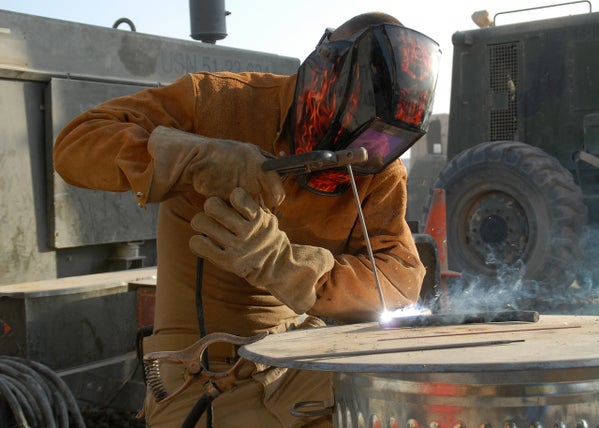At A Glance: Welders, Cutters, and Welder Fitters
Welders, cutters, and welder fitters weld and join different materials to fill holes, indentations or seams. They may work in manufacturing to create, repair and inspect parts or final products. Increasingly welder, cutters, and fitters can be found in the energy industry building, repairing and inspecting pipeline. Because of the tools they use and products they make, individuals with these titles must know how to operate welding equipment safely, effectively, and efficiently.
To become a welders, cutters, and welder fitters requires training in a vocational school, related on-the-job experience, and/or an associate's degree or apprenticeship. The average earnings of a welder, cutter, and welder fitter is approximately $19.89 an hour, and the need for such workers typically grows at an average rate, from about 5% to 9% per year.
Entry Level Requirements
High School Diploma
To become a welder, cutter, or welder fitter it is required to fulfill all credits and receive your high school diploma for entry level employment.

Men make up
77%
of the manufacturing workforce in the Tri-State region.
How much can I make?
Hourly Rate: $13 - $31/HR.
Job Details: Welders, Cutters, and Welder Fitters
Video produced and provided by CareerOneStop.org
Commonly Performed Tasks
There are a variety of tasks that welders, cutters, and welder fitters must perform on a regular basis. They utilize safety equipment and follow safe practices while working, including the routine examination of work pieces and equipment. Welders, cutters, and welder fitters must recognize, set up, and operate a variety of common welding tools and make appropriate selections based on welding chart specifications per welding job.
- Lay out, position, align, and secure parts and assemblies prior to assembly using tools
- Clamp, hold, tack-weld, heat-bend, grind, or bolt components to obtain needed positions for welding
- Weld separately or in combination, using aluminum, stainless steel, cast iron, and other alloys
- Examine workpieces for defects and measure workpieces to ensure conformance with specifications
- Install torches, torch tips, filler rods, and flux based on welding chart specifications or metals
- Start gas flow, ignite torches, adjust power supplies, and strike arcs by touching electrodes
- Operate safety equipment and use safe work habits
Required Job Skills
Welders, cutters, and welder fitters require specific skills, abilities, and knowledge to do their jobs effectively. The nature of their work requires they pay close attention to produce quality work and to keep a safe environment.
- Identify, analyze, and solve complex problems
- Concentrate on a task without being distracted
- Comprehend complex informational text and visuals
- Knowledge of materials, processes, and systems
- Commitment to safety, quality, and precision
Education & Training Information
Programs and Opportunities
Community College of Allegheny County - South Campus
Program: Welding, Gas & Oil
Certification: Certificate
Length: 1 Year
West Virginia Northern Community College
Program: Welding, Oil & Gas Pipe
Certification: Certificate
Length: 2 Years
West Virginia Northern Community College
Program: Welding Technology
Certification: Associate's Degree
Length: 2 Years
Eastern Gateway Community College - Youngstown Campus
Program: Welding
Certification: Associate's Degree
Length: 2 Years
Westmoreland County Community College
Program: Welding Engineering Technology
Certification: Associate's Degree
Length: 2 Years
Pennsylvania College of Technology
Program: Welding Technology
Certification: Associate's Degree
Length: 2 Years
